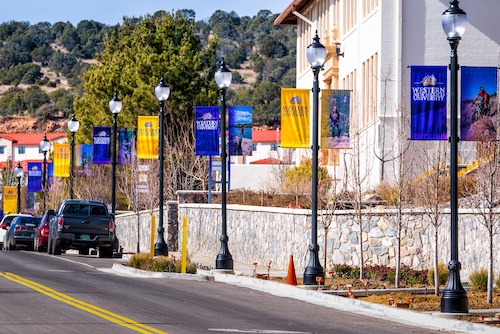 SILVER CITY, NM—The WNMU School of Education is in its second year of offering a Teacher Residency program that allows students finishing their coursework to earn $35,000 for a two-semester guided apprenticeship in which they work alongside mentor educators. The program was created following the passage of House Bill 13, the Teacher Residency Act, which in 2022 established funding and guidelines for offering teacher residencies across the state.
SILVER CITY, NM—The WNMU School of Education is in its second year of offering a Teacher Residency program that allows students finishing their coursework to earn $35,000 for a two-semester guided apprenticeship in which they work alongside mentor educators. The program was created following the passage of House Bill 13, the Teacher Residency Act, which in 2022 established funding and guidelines for offering teacher residencies across the state.
According to Assistant Professor of Secondary Education Stephanie Fanselow, who directs the program at WNMU, lawmakers created the program as a measure to grow and diversify the teaching workforce in response to the Yazzie/Martines v. State of NM case. "They want teachers who look like the kids in the classroom," she said. What that means can vary in different parts of the state, depending on the local population, said Fanselow.
The residency is a two-semester program that pairs each teacher resident with a mentor teacher who works in a New Mexican public or tribal school. Students planning to teach at any grade level and in any subject are eligible to apply, and they are expected to teach in New Mexico for at least three years after completion of the program.
Twenty-four student teachers completed the residency program and graduated in the spring of 2023. All of them are currently working in New Mexico schools, with twenty-one of them in full-time teaching positions. This fall, fifteen students were enrolled in the program, with an additional contingent starting in the spring of 2024.
At the beginning of each residency, Fanselow meets with each mentor teacher and teacher resident "to talk about the expectations of the program, what the program does, [and] how to do co-teaching—because that is the model we use." Fanselow said she asks the mentor teachers to think of themselves as preparing the resident teachers to be their future colleagues. She encourages them to take residents to meetings and to help them understand the system at that school, so the mentorship extends outside the classroom.
In addition to providing $35,000 to each teacher resident, the program also provides $1000 to each mentor teacher to compensate them for the time mentorship takes. School principals at participating schools are also compensated $1000 for their administrative time.
The resident's compensation package is critical to the success of the program, said Fanselow. Many students in the College of Education are nontraditional and need to have an income. In the past, they were required to do student teaching to complete their degree, but because this was not compensated, many students were not able to graduate from the program. Fanselow expects the residency program to increase the graduation rate and to especially benefit students of color, single parents, and nontraditional students in education. She also hopes the program will encourage more WNMU students to major in education.
Rachael Contreras, a recent graduate of WNMU Teacher Residency and now a kindergarten teacher at Los Lunas Elementary in Los Lunas, NM, felt that the program prepared her for the realities of teaching. "Through the program I was able to build confidence for my first year of teaching," said Contreras, "The hands-on and in-person experience for a full year with students was extremely helpful. My mentor and professors were able to guide me in the classroom to where I felt knowledgeable and prepared for my own students and classroom."
Branden Jaquemai, who is also a recent graduate and now teaches social studies at Gadsden High School in Gadsden, NM, also found the program beneficial. Jaquemai explained, "I feel like I would be further behind this year teaching on my own than I am by participating in the program. The residency taught me a lot of lessons, but the biggest one is getting to truly know your students and build relationships with each of them. They trust you and furthermore their parents and guardians trust you. This allows you to push them to their potential and their family gives you the support to do so."
Jaquemai hopes that more education majors take advantage of the opportunity. "I would highly recommend the residency program to anyone who is considering it or is on the fence. The program also gets your foot in the door of a school you want to be at. It gives you the opportunity to show the administration what you are capable of and get a job there if possible. It was truly an invaluable experience."
According to Fanselow, the Teacher Residency Program not only benefits the teacher resident, but it also helps the students to have an additional teacher in the classroom, as it allows each student to have more individual attention, ultimately benefitting their education. She sees this effect being strongest for the state's younger learners. "Reading skills [and] basic math skills are so important, and to have two teachers … is going to give them a solid foundation to then stay on grade level and continue learning."










